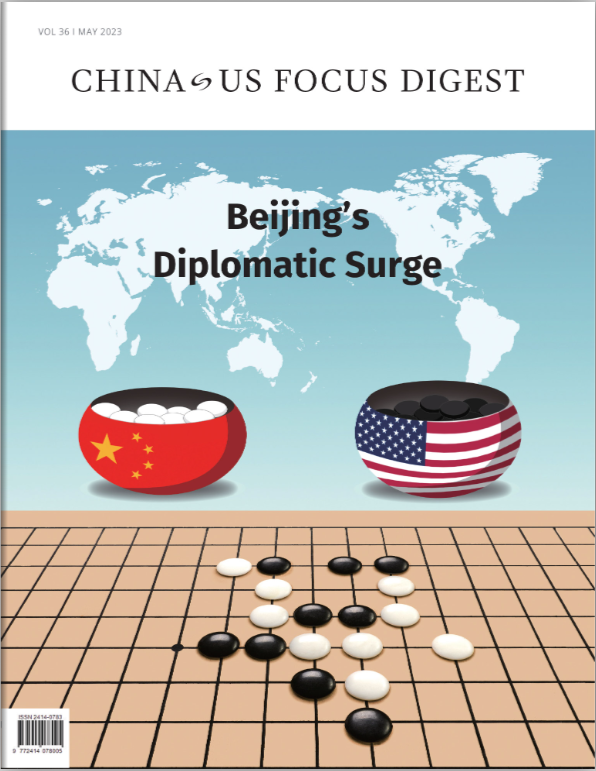
The G7 recently held a summit in Hiroshima, Japan. Unfortunately, it issued a communique critical of China, and released an economic security document that casts China in a negative light.
At the conference, which is supposed to prioritize economic policy coordination, the participants failed to propose practical solutions to current major risks and challenges in global economic governance. To make matters worse, they deliberately created divisions and provoked geopolitical confrontation, highlighting the G7 platform’s decline.
Established in the 1970s, the G7 mechanism began as an informal diplomatic summit that helped Western countries tackle global economic and monetary crises. At first, the seven member countries accounted for 62 percent of the global economy, giving them significant influence. However, since the early 21st century, the G7’s total GDP ratio has been declining steadily because of a shift in the global distribution of power from West to East. The IMF estimates a sharp fall to 30 percent by the end of this year.
Looking at additional data, when using purchasing power parity calculations, the combined GDP of BRICS countries has surpassed that of the G7. Further, since the onset of the 2008 financial crisis, the G20 has increasingly taken over the primary role in policy coordination for the world’s major economies, highlighting the G7’s loss of influence. This shift has occurred because the G20 represents a more balanced and inclusive set of interests, encompassing developed and developing nations in global economic governance.
The G7’s inherent inadequacy as a global economic coordination mechanism stems from its tendency to begin discussions from the viewpoint of a small group of developed countries striving to maintain their dominant position in world economic affairs and prioritizing their narrow interests. This mindset can distort members’ perspectives on the major problems facing the world economy, lead to the formulation and interpretation of international economic regulations that emphasize maximizing their individual interests and neglect their own shortcomings.
Currently, developed countries face numerous economic challenges, including high public debt and inflationary pressure resulting from the over-issuance of currency during the pandemic. Additionally, the U.S. Federal Reserve’s aggressive rate hikes have affected global financial stability and capital flows, while the impending risk of an American national debt default garnered widespread concern.
A default, which was narrowly averted, could have jeopardized worldwide financial stability and profoundly shake the foundation of the U.S. dollar’s dominance. President Biden even had to cut his trip to Japan short to handle challenging negotiations regarding the debt limit with congressional Republicans. These critical issues were notably absent from the G7 leaders’ communique.
The G7 countries previously flaunted their high living standards and mitigation of domestic class conflicts, all in an effort to prove the superiority of their own system. However, at present, several issues confront the seven nations that are beyond their ability to overcome, leading them to divert attention away from their internal difficulties by hyping up international issues.
After 40 years of operating with the capitalist model of neoliberalism, internal problems have reached an irreconcilable point. The United States, Japan and the European Union are all heavily indebted, with slow growth and an overemphasis on finance and the virtual economy which has caused extensive de-industrialization. Winner-take-all politics has exacerbated wealth gaps and social conflict. The U.S. debt crisis indicates that its political system has largely failed.
The struggle between the administration and Congress over raising the debt ceiling concealed the reality that the U.S. national debt has spiraled out of control and become a Ponzi scheme. Economic difficulties have led to the rise of populism in several countries, and fascist politics is emerging, which is a cause for concern.
Click to read the latest issue of China-US Focus Digest
The domestic challenges that the G7 countries face are far more significant than the international ones, and their domestic foundation of global leadership is in a state of upheaval. To put it succinctly, the West’s contribution to global economic governance is more a problem than a solution or answer.
The rapid ascent of China and its relative shift in power compared with the G7 has caused psychological stress within G7 nations, as they fear losing their dominant position in the world economy and are taking measures to suppress China’s growth. While in 2000 China’s GDP only accounted for 5.5 percent of the total GDP of G7 countries, it has since risen significantly to reach 41.5 percent in 2021. In terms of the proportion of manufacturing value-added, China was responsible for only 15 percent of the G7’s total in 2004; but in 2021, it made up a hefty 91.5 percent of the seven countries’ combined total.
The World Bank estimates that from 2013 to 2021, China’s contribution to global economic growth averaged 38.6 percent, surpassing the combined contribution rate of all G7 countries. These figures demonstrate that any mechanism or platform discussing global economic governance must necessarily acknowledge China’s significance as a key driver of world economic growth.
Nonetheless, nations such as the United States and Japan view China’s development as a threat rather than an opportunity. These countries are singularly focused on disrupting China’s momentum of growth, blocking its upward movement in value and industrial chains, and confining it to low-end manufacturing. In pursuit of these goals, these nations have even resorted to anti-globalization tactics, initiating trade wars and technological battles and promoting decoupling measures. Such actions significantly increase the level of uncertainty in the global economy and risk creating two mutually isolated and opposing systems in the overall world market.
The G7’s economic security document introduced during the summit emphasized the importance of economic resilience and condemned economic coercion, yet the adoption of economic coercion and suppression against China, without allowing it to retaliate, has led to China’s rightful opposition. Developed countries such as the United States have a history of employing economic sanctions, embargoes and other measures to coerce other nations, but now it is itself experiencing the danger of being coerced. This indicates a shift in the world order.
In the post-COVID-19 era, the world economy is in dire need of a restart, and economic globalization is undergoing a transformation. While it was initially dominated by developed Western countries and mainly served the interests of transnational capital, the economy is now transitioning to a more inclusive and balanced type of globalization. This is not a transformation that the G7 can effectively control.
In recent years, China put forth the Belt and Road Initiative, increasing investment in infrastructure construction for other developing countries. It proposed global security and development initiatives and aimed to achieve national rejuvenation through Chinese modernization, providing a new development model and a path for other developing countries to follow. Its inclusive and interactive approach has been widely welcomed by other developing countries and represents a new direction of transnational cooperation on global economic governance and developmental challenges.
The G7 countries’ attacks on China will not solve their own problems or, more important, help address the challenges facing the global economy. From a geopolitical standpoint, viewing China’s rise as a threat is an approach that’s doomed to fail. Such confrontations do not align with the common interests of most members of the international community and even go against the national interests of those nations instigating the conflicts.
This may lead to self-reflection by their decision-makers, as well as policy adjustments seeking better outcomes. One example of this phenomenon is the recent shift in policy expressions from U.S. and European leaders regarding their economic relationship with China. These reflect movement toward risk mitigation rather than decoupling.

